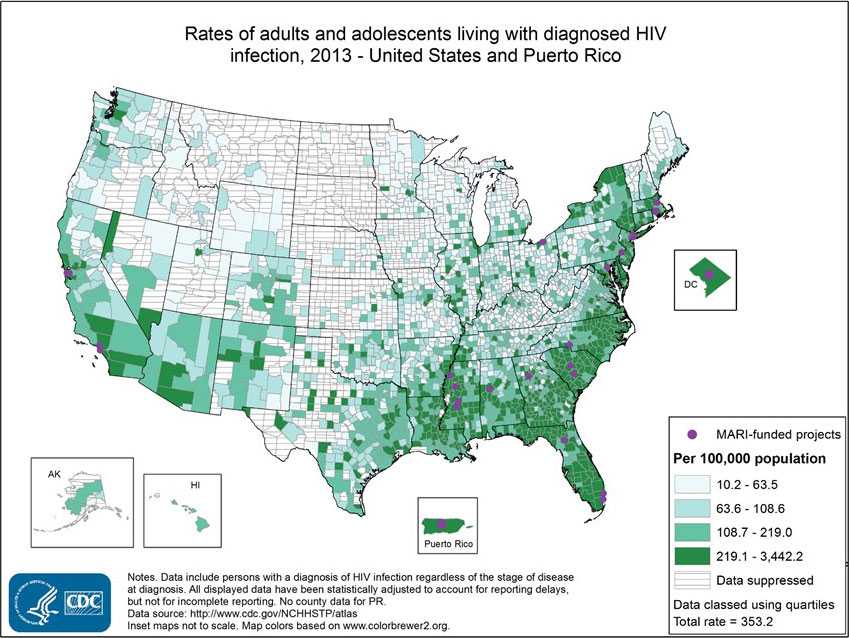
Mission and Purpose
The Minority HIV/AIDS Research Initiative (MARI) program was established in 2003 to build capacity for HIV epidemiologic and prevention research in mostly Black and Hispanic/Latino communities and among Black and Hispanic/Latino investigators working in highly affected communities. The MARI program supports the CDC’s overarching goal to promote health and reduce disease and disability by funding research that has the potential to reduce burden and to result in high public health impact.
The goals of the MARI program are:
- To build HIV prevention research capacity in minority communities in which little research has been conducted by partnering with and developing new investigators in these communities to address pertinent and community-driven research questions.
- To engage in career development and provide research opportunities for new investigators from mostly Black and Hispanic/Latino communities through collaboration with the Division of HIV/AIDS Prevention at CDC. This will be achieved by encouraging these scientists to develop independent research skills needed to gain experience in HIV epidemiologic and prevention research, to present the results of their research within their communities and at national conferences, and to publish their results in peer-reviewed journals.
- To develop and conduct HIV epidemiologic prevention research, in the form of limited case-controlled, cross-sectional, or qualitative projects that have public health relevance to communities highly affected by the HIV epidemic.
Program Details
MARI has been announced as a funding opportunity grant, which is open to all qualifying applicants, four times to date: 2003, 2007, 2011, and 2016. Eligible MARI applicants must (1) have a research or a health professional masters- or doctorate-level degree from an accredited school or program, (2) have no history of having been a primary investigator on any Department of Health and Human Services—supported HIV research award of $250 000 or more, (3) preferably be indigenous to communities of color that are overrepresented in the domestic HIV epidemic (mostly Blacks and Hispanics), and (4) have demonstrable and validated HIV prevention experience with communities of color and direct access to study populations from affected communities. Investigators from academic and nonacademic settings are eligible to apply. All MARI applications undergo an objective review with HIV and health disparity subject matter experts who are external to the CDC; applications are scored and ranked for funding considerations.1, 2.

Applicants
The MARI program is not accepting applications at this time. For additional information and upcoming application dates please contact:
- Madeline Sutton, MD, MPH, FACOG: msutton@cdc.gov
- Ashley Murray, MPH, CHES, CPH: ajmurray@cdc.gov
- Kirk Henny, PhD: khenny@cdc.gov
References
- Sutton MY, Lanier Y, Willis LA, Castellanos T, Dominguez K, Fitzpatrick L, Miller KS. Strengthening the network of mentored, underrepresented minority scientists and leaders to reduce HIV-related health disparities. American Journal of Public Health 2013; DOI: 0.2105/AJPH.2013.301345.
- Fitzpatrick LK, Sutton MY, Greenberg AE. Toward eliminating health disparities in HIV/AIDS: The importance of the minority investigator in addressing scientific gaps in Black and Latino communities. Journal of the National Medical Association 2006;98:1906-1911.
- Page last reviewed: July 31, 2017
- Page last updated: July 31, 2017
- Content source: Division of HIV/AIDS Prevention, National Center for HIV/AIDS, Viral Hepatitis, STD, and TB Prevention, Centers for Disease Control and Prevention


 ShareCompartir
ShareCompartir